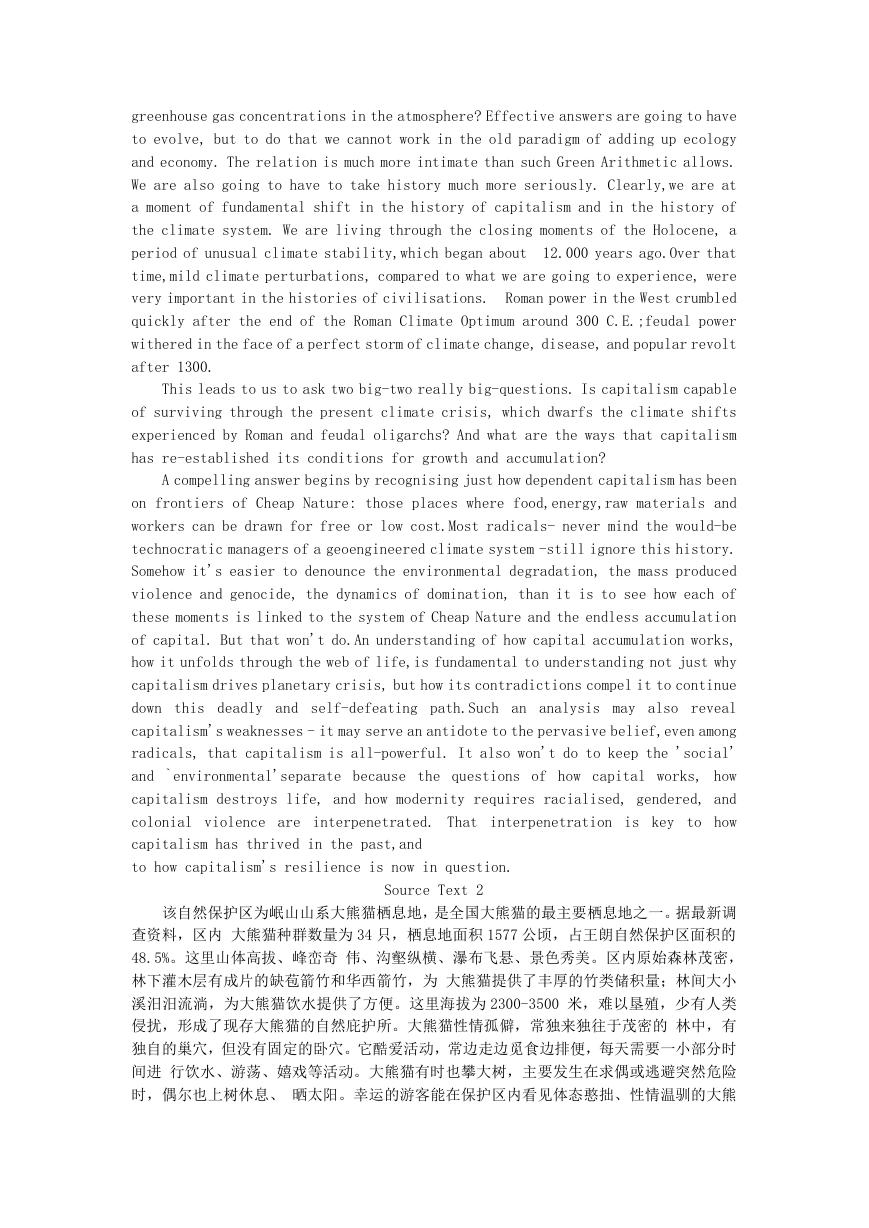2020 年四川西南科技大学英语翻译基础考研真题
I. Directions:Translate the following words,abbreviations and terminologies
into their target languages respectively. If the item is in English, its target
language is Chinese.Ifthe item is in Chinese, its target language is English. There
are altogether 30 items in this part of the test,15 in English and 15 in Chinese,
with one point for
each.(30")
1.trade commissioner
2.Chamber of Commerce
3.in-bound tourism
4.the Human Genome Project
5.market volatility
6.product catalogue
7.MDGs
8.diplomatic corps
9.noble aspirations
10.avian influenza
11. launch pad
12.live up to the pledge
13.board of directors
14.capacity building
15. hegemonism and power politics
16. 主题馆
17. 高级职称
18.民政部
19. 外汇储备
20. 单边主义
21. 跟团旅游
22. 政治思想教育
23. 非物质文化遗产
24. 投资回报率
25. 热水器
26. 贪污腐败
27. 城乡一体化
28. 节能减排
29. 全方位外交
30.原始社会
II.Directions: Translale the following source texis into their target languages
respectively. If the source text is in English, its target language is Chinese. If
the source text is in Chinese, its target language is English.(120')
Source Text 1
How can we understand the systemic interrelation between socioeconomic and
ecological trends,between something like faltering accumulation and sharply rising
�
greenhouse gas concentrations in the atmosphere? Effective answers are going to have
to evolve, but to do that we cannot work in the old paradigm of adding up ecology
and economy. The relation is much more intimate than such Green Arithmetic allows.
We are also going to have to take history much more seriously. Clearly,we are at
a moment of fundamental shift in the history of capitalism and in the history of
the climate system. We are living through the closing moments of the Holocene, a
period of unusual climate stability,which began about
12.000 years ago.Over that
time,mild climate perturbations, compared to what we are going to experience, were
very important in the histories of civilisations.
Roman power in the West crumbled
quickly after the end of the Roman Climate Optimum around 300 C.E.;feudal power
withered in the face of a perfect storm of climate change, disease, and popular revolt
after 1300.
This leads to us to ask two big-two really big-questions. Is capitalism capable
of surviving through the present climate crisis, which dwarfs the climate shifts
experienced by Roman and feudal oligarchs? And what are the ways that capitalism
has re-established its conditions for growth and accumulation?
A compelling answer begins by recognising just how dependent capitalism has been
on frontiers of Cheap Nature: those places where food,energy,raw materials and
workers can be drawn for free or low cost.Most radicals- never mind the would-be
technocratic managers of a geoengineered climate system -still ignore this history.
Somehow it's easier to denounce the environmental degradation, the mass produced
violence and genocide, the dynamics of domination, than it is to see how each of
these moments is linked to the system of Cheap Nature and the endless accumulation
of capital. But that won't do.An understanding of how capital accumulation works,
how it unfolds through the web of life,is fundamental to understanding not just why
capitalism drives planetary crisis, but how its contradictions compel it to continue
down this deadly and self-defeating path.Such an analysis may also reveal
capitalism's weaknesses - it may serve an antidote to the pervasive belief,even among
radicals, that capitalism is all-powerful. It also won't do to keep the 'social'
and `environmental'separate because the questions of how capital works, how
capitalism destroys life, and how modernity requires racialised, gendered, and
colonial violence are interpenetrated. That interpenetration is key to how
capitalism has thrived in the past,and
to how capitalism's resilience is now in question.
Source Text 2
该自然保护区为岷山山系大熊猫栖息地,是全国大熊猫的最主要栖息地之一。据最新调
查资料,区内 大熊猫种群数量为 34 只,栖息地面积 1577 公顷,占王朗自然保护区面积的
48.5%。这里山体高拔、峰峦奇 伟、沟壑纵横、瀑布飞悬、景色秀美。区内原始森林茂密,
林下灌木层有成片的缺苞箭竹和华西箭竹,为 大熊猫提供了丰厚的竹类储积量;林间大小
溪汨汨流淌,为大熊猫饮水提供了方便。这里海拔为 2300-3500 米,难以垦殖,少有人类
侵扰,形成了现存大熊猫的自然庇护所。大熊猫性情孤僻,常独来独往于茂密的 林中,有
独自的巢穴,但没有固定的卧穴。它酷爱活动,常边走边觅食边排便,每天需要一小部分时
间进 行饮水、游荡、嬉戏等活动。大熊猫有时也攀大树,主要发生在求偶或逃避突然危险
时,偶尔也上树休息、 晒太阳。幸运的游客能在保护区内看见体态憨拙、性情温驯的大熊
�
猫在栖息地或坐卧,或饮水,或嬉戏,各得其所。
�






 2023年江西萍乡中考道德与法治真题及答案.doc
2023年江西萍乡中考道德与法治真题及答案.doc 2012年重庆南川中考生物真题及答案.doc
2012年重庆南川中考生物真题及答案.doc 2013年江西师范大学地理学综合及文艺理论基础考研真题.doc
2013年江西师范大学地理学综合及文艺理论基础考研真题.doc 2020年四川甘孜小升初语文真题及答案I卷.doc
2020年四川甘孜小升初语文真题及答案I卷.doc 2020年注册岩土工程师专业基础考试真题及答案.doc
2020年注册岩土工程师专业基础考试真题及答案.doc 2023-2024学年福建省厦门市九年级上学期数学月考试题及答案.doc
2023-2024学年福建省厦门市九年级上学期数学月考试题及答案.doc 2021-2022学年辽宁省沈阳市大东区九年级上学期语文期末试题及答案.doc
2021-2022学年辽宁省沈阳市大东区九年级上学期语文期末试题及答案.doc 2022-2023学年北京东城区初三第一学期物理期末试卷及答案.doc
2022-2023学年北京东城区初三第一学期物理期末试卷及答案.doc 2018上半年江西教师资格初中地理学科知识与教学能力真题及答案.doc
2018上半年江西教师资格初中地理学科知识与教学能力真题及答案.doc 2012年河北国家公务员申论考试真题及答案-省级.doc
2012年河北国家公务员申论考试真题及答案-省级.doc 2020-2021学年江苏省扬州市江都区邵樊片九年级上学期数学第一次质量检测试题及答案.doc
2020-2021学年江苏省扬州市江都区邵樊片九年级上学期数学第一次质量检测试题及答案.doc 2022下半年黑龙江教师资格证中学综合素质真题及答案.doc
2022下半年黑龙江教师资格证中学综合素质真题及答案.doc